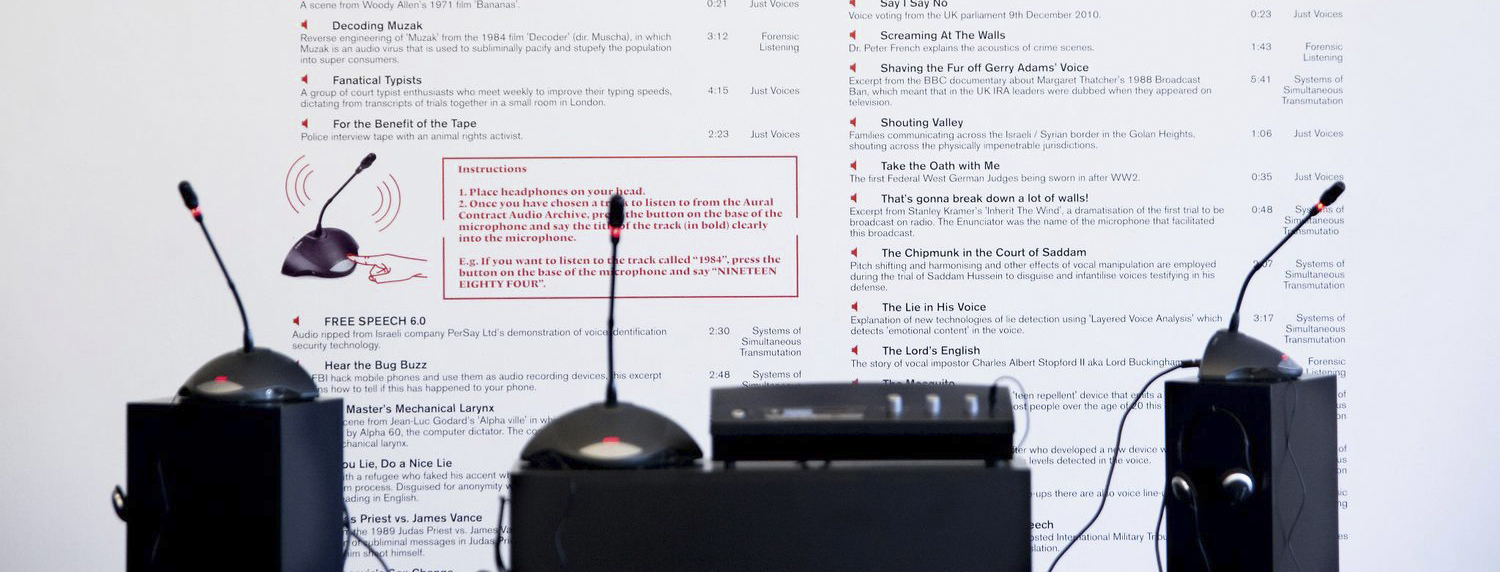Curated by Liquid Architecture for Melbourne Festival
Artist Lawrence Abu Hamdan
Lawrence Abu Hamdan's (b. 1985, Amman, Jordan) work examines the contemporary politics of listening—its relationship to power, borders, human rights, testimony and truth—through the production of audio documentaries and essays, installations, sculpture, photography, and performance.
In 2010, he began development on Aural Contract, an umbrella title for ongoing works investigating the role of the voice in law, and the changing nature of testimony, in the face of new regimes of border control, algorithmic technology, medical science, and modes of surveillance.
Aural Contract works take varied forms, but all draw from an evolving sound archive—built by the artist—containing extracts of recordings from political and criminal courts, police evidence, films, literature and other sources. In 2013, Abu Hamdan’s audio documentary The Freedom of Speech Itself was submitted as evidence at the UK asylum tribunal where the artist himself was called to testify as an expert witness.
At Melbourne Festival, sound art organisation Liquid Architecture will present a series of audio documentaries from Abu Hamdan’s Aural Contract as a 'live listening event' in an immersive dark cinema setting.
Further developing the theme will be talks by James Parker and Poppy da Souza. Parker’s work investigates law’s sonic imagination, with a focus on the jurisprudential issues of sonic warfare. Da Souza inquiry asks “how listening works, and what listening does in our post-convergent, post-Snowden, post-privacy moment.”
Aural Contract is part of a program surrounding the themes and subject that are prevalent in 1984.
Biographies
Dr James Parker
is a lecturer at Melbourne Law School, where he is also director of the research program ‘Law, Sound and the International’ at the Institute for International Law and the Humanities. James’ monograph Acoustic Jurisprudence: Listening to the Trial of Simon Bikindi (OUP, 2015) looks at the trial of Simon Bikindi, who was accused by the International Criminal Tribunal for Rwanda of inciting genocide with his songs. James' current research explores legal questions around the weaponisation of sound across three main sites: the battlefield, the torture chamber and the city. James is also an active music critic and radio broadcaster.
Poppy de Souza
is an interdisciplinary scholar and cultural practitioner who has worked in curatorial, educational, archival, community arts and academic contexts. Both her research and practice are concerned with the politics of 'voice'. Her work investigates the relationship between new assemblages of technology, everyday forms of cultural production, and the contemporary conditions of 'voice poverty'. Poppy has recently completed her PhD "Beyond Voice Poverty: New Economies of Voice and the Frontiers of Speech, Listening and Recognition" through the University of Melbourne.
Liquid Architecture
Liquid Architecture is an Australian organisation for events, exhibitions, performances and situations of the world’s leading artists working with sound. Marking the new direction driven by artistic directors Joel Stern and Danni Zuvela is the festival’s focus on social and conceptual questions, signalling a more sustained engagement with the discourse, sounds, and practices of contemporary art.
Liquid Architecture is an Australian organisation for artists working with sound. Liquid Architecture is interested in the most compelling, challenging and vital practices and theories of sound art. LA investigates the sounds themselves, but also the ideas communicated about, and the meaning of, sound. Our program stages encounters and creates spaces for sonic experience, and critical reflection on systems of sonic affect.
To do this, we host complex and engaging experiences at the intersection between contemporary art and experimental music, supporting artists to produce performances and concerts, exhibitions, talks, reading groups, workshops and recordings in art spaces, music venues and other sites. Liquid Architecture is curatorially driven; we develop rigorous curatorial frameworks that are internationally benchmarked in a methodology that embraces research, collaboration and imagination. We want to echo beyond local conversations, problems, debates and questions, to reverberate across media and disciplines, and so to sound out new discourses about the audible world, and beyond.
Aural Contract: The voice before the law is curated by Liquid Architecture for Melbourne Festival.
